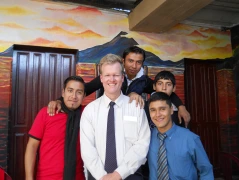The dead bodies hanging by a noose on public streets and markets disturbed Ramin Parsa, a child growing up in Iran during the strict Shiite Muslim regime of the Ayatollah Khomeini.

“They executed people in front of children,” Ramin says on a video posted to his channel. “I could not eat for two weeks, I was so shocked.”
When Khomeini and the anti-American Islamic radicals staged a coup and ousted the Shah of Iran, they implemented a stringent form of Islam that included public executions of alleged enemies and self-flagellation while walking barefoot through the streets.
“The newspaper is Islamic. The media is Islamic. Schools are Islamic. Society is Islamic. Everything you can see and hear is Islamic,” he says. They want to dish in doctrine. They want to brainwash you. We had no magazines, no books. They showed the caricature of the Israeli soldiers, killing Palestinian babies and they sowed the seed of hatred in our hearts.”
Deeply motivated to live for Allah, Ramin went to the mosque every morning at 5:00 am for the earliest of five callings to prayer a day. Every morning at school, they shouted, “Death to Israel! Death to America!”
But when his dad died, life dried up for him. He was no longer able to go to school.

“I started questioning my faith,” he admits. “Is this really the truth that we believe? I started going down and down and down into hopelessness, into depression. I left all my friends. I left all my family. I left everybody that I knew and I locked myself in a dark room, turned the lights off and was thinking about past and present and future.”
Death haunted him after his father’s death. It haunted him because Islam offers no real assurance that you will be admitted into Paradise. The true Muslim is constantly warned to do more, to pray and fast — and even join jihad — to curry Allah’s elusive favor and be granted entrance into the afterlife..
“Out of fear I said, ‘What is gonna happen to me when I die?” he says.
Aside from the public hangings, he also saw men’s backs slashed and bloodied for drinking alcohol. Mohammad prescribed public punishments to instill fear in the populace.
The Revolutionary Guard routinely prowled the streets. If you were wearing a T-shirt with the image of someone, they took it from you and punished you. Islam stringently prohibits artistic renditions of any person or animal as a means to avoid people falling into idolatry. This is why so many of the earliest architecture has ornate geometric patterns but no other artwork.
“I came to the conclusion that Islam is empty,” Ramin says. “I said, ‘If there is no god, then who made this creation, who made the stars, who made the heaven, who made the humans? If there is a God, then why isn’t He helping us?”
In spite of it being illegal, every house has a satellite dish, which is a great alternative to the non-stop religious propaganda pumped out over government-run channels.
So he flipped on Trinity Broadcast Network. He heard about Jesus. Everything he heard through Islam about Jesus was contradicted: The Son of God did indeed die for our sins; he was more than just a prophet.
Importantly, he rose from the dead.
Ramin didn’t immediately believe. He had been taught it was “baloney,” so he turned it off. Read the rest: Who is Ramin Parsa?



Wow